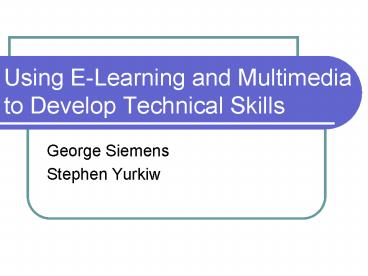Using E-Learning and Multimedia to Develop Technical Skills PowerPoint PPT Presentation
1 / 20
Title: Using E-Learning and Multimedia to Develop Technical Skills
1
Using E-Learning and Multimedia to Develop
Technical Skills
- George Siemens
- Stephen Yurkiw
2
Setting the Scene
- Drivers of change
- New environment
- Need to implement new approaches to meet needs
- Integrating vocational and technology
3
Terms
- Vocational Education
- Skill-based learning
- Elearning
- Technology-enabled learning
- Vocational E-Learning
- Skill-based Technology-enabled learning
4
Goals of Education
- Acquire tools for survival
- Discover meaning
- Learning to learn
- More humane communities
- Role in social reform/reconstruction
- Not only to equip to contend with reform, but to
initiate - Secure democracy
- Jerold Apps, Dewey, Lindeman, Bergevin
5
Goals of Vocational Education
- To prepare for gainful employment
- Must be close to real world
- Instructor must be successful practitioner
- Curriculum must reflect content of occupation
- Create skill set and attitudes needed to succeed
in a particular field
6
Change in Teachers Role
- Due to focus of individual, social objectives and
furthering of technical field, teacher is partner
with learner - Teacher is helper, facilitator, guide, encourager
- Student is not object of teaching, but focus of
learning - Bergevin, Lindeman
7
Learning EcologyWhat do learners need to learn?
- Content text, videos, interactive activities,
animations, etc. - Forums to connect with learners (i.e. replicate
real life in career) - Mentorship apprentice, instructor/chef
- Access education outside of a physical location
- Flexibility education that accounts for life
8
Reducing Irrelevant Learning
- Technical students have varying background and
skills - ALL are at different points
- Education needs to permit entry and access based
on skill/experience - Requires complete system change, but the process
can be mimicked online i.e. student controls
pace
9
Stages of Knowing
- Linking association between concepts/knowledge
- Reproducing copying something as taught
- Interpreting using existing knowledge to
recognize needs and guide actions/decisions in
new situation - Applying applying existing knowledge/skills to
solve new problems - Adapted from Broudy, Smith, Burnett
10
How Can Technology Meet Vocational Education
Goals?
- Technology as a supplement, not replacement
- Tech improves access flexibility
- Tech can communicate skills theories
- Tech better quality assurance
- F2F needed to develop social/industry awareness
11
Elearning Overview
- History
- Drivers
- Why is it changing learning?
- How is it changing learning?
- Scope and size
12
Combining Technology Classroom
- Blended
- Saves instruction time
- Increases learning efficiency
- Anxiety and intimidation in regular classroom
minimized - Practice to proficiency
- Variable learning rates
13
Tools Technologies
- Streaming
- Video
- Audio audio blogging, pronunciation, VoIP
- Internet LMS, blogging, simple starts, email,
discussions - Software development, delivery, collaborate
- Simulations
14
Examples
- Dining Room Skills
- Culinary Arts
- Menu
- Online Course
15
Our Experiences
- Culinary Arts
- Hotel and Restaurant Administration
- Teaching right way upfront
- Unlimited repetitive feedback
16
Results
- Success indicators no quantitative data yet
- Initial anecdotal feedback
- Better learning
- Marks same as with traditional classes
- Instructor Observations
- Student Feedback
17
Student Experiences
- Student comments
- Engaging
- Fun way to learn
- I can learn when I want - Flexibility
- Im in control
- No instructor physically present disorienting
to some students
18
Implications
- Technology as a tool
- Elearning meets needs of technical education
access, flexibility, quality - Theory, skills, relationships, mentorship can
all be taught/enhanced via elearning
19
What is still needed
- Administration support
- Model for elearning development skill based
industry (plumbing etc.) - Tech advances ability to stream confidently
- Training instructors how to develop and use
technology in teaching
20
Conclusions
- Change drivers are significant
- New student/industry needs require new approaches
- Continued vocational e-learning can
- Expand the field
- Improve education
- Result in higher student satisfaction
- Greater organizational quality control

